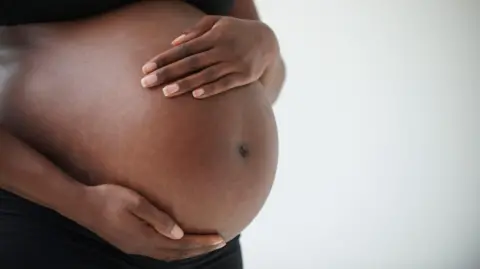Pregnancy trial to prevent anaemia launched
 Getty Images
Getty ImagesResearchers are hoping a new treatment for pregnant women could help reduce the risk of stillbirth.
Figures from a trial being led by NHS Blood and Transplant and the University of Oxford show one in three expectant mothers will develop anaemia.
It is a condition where the blood produces a lower-than-normal amount of red blood cells and can be linked to stillbirth, postnatal depression and haemorrhages.
Now the research team is working with maternity wards across the UK to carry out a study by giving pregnant women an iron supplement to see if it helps.
Hayley Wheeler, a research midwife at Royal Hospital Berkshire, explained: "At the moment, if women are diagnosed with anaemia during pregnancy they will be treated for it, but sometimes it can be a little bit too late."
The trial is being funded by the National Institute for Health and Care Research (NIHR) and will involve giving half the mothers taking part one iron supplement a day and the other half a placebo.
'More research and scrunity'
John Radcliffe Hospital is another hospital taking part.
Simon Stanworth, a consultant haematologist at NHS Blood and Transplant in Oxford, said: "Generally we have taken an approach of treating it, but what we're doing with this study is trying to see if we can prevent anaemia happening and therefore hopefully we reduce some of those complications.
"We don't know whether taking a single tablet of iron each day will have a benefit."
Researchers are working with up to 50 maternity wards across the country, including John Radcliffe.
The trial, called PANDA, is open to women who are in the first 16 weeks of pregnancy with a single baby and women can ask their healthcare professional for more information or ask about taking part.
Mr Stanworth said: "This is a very common medication, iron, and actually even in 2025 we don't really know how to use it.
"There's some very common treatments and managements, we're beginning to put a lot more research and scrutiny on these now moving forward and trying to now see if we can do better."
You can follow BBC Oxfordshire on Facebook, X (Twitter), or Instagram.
